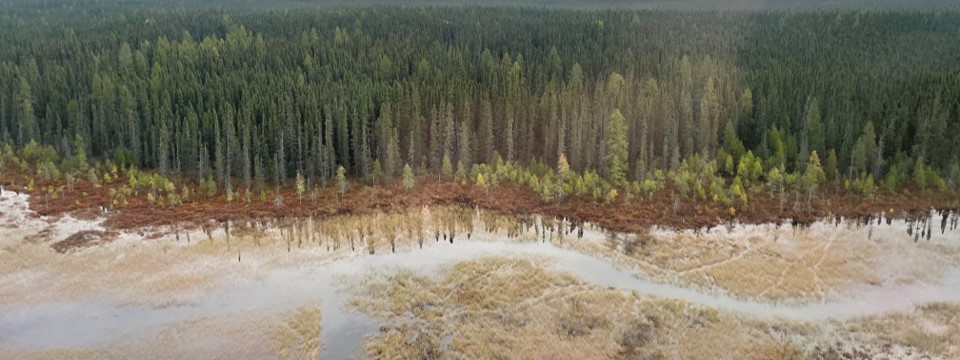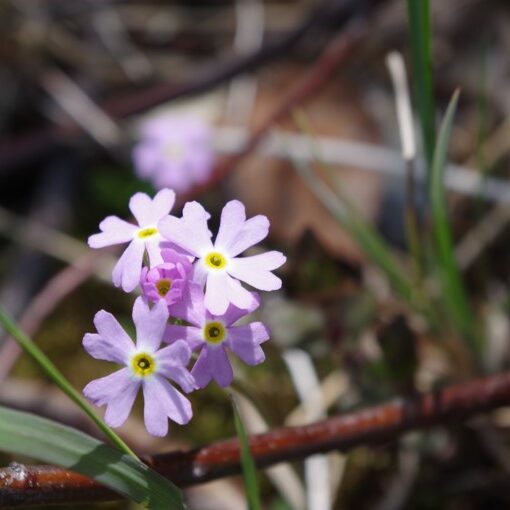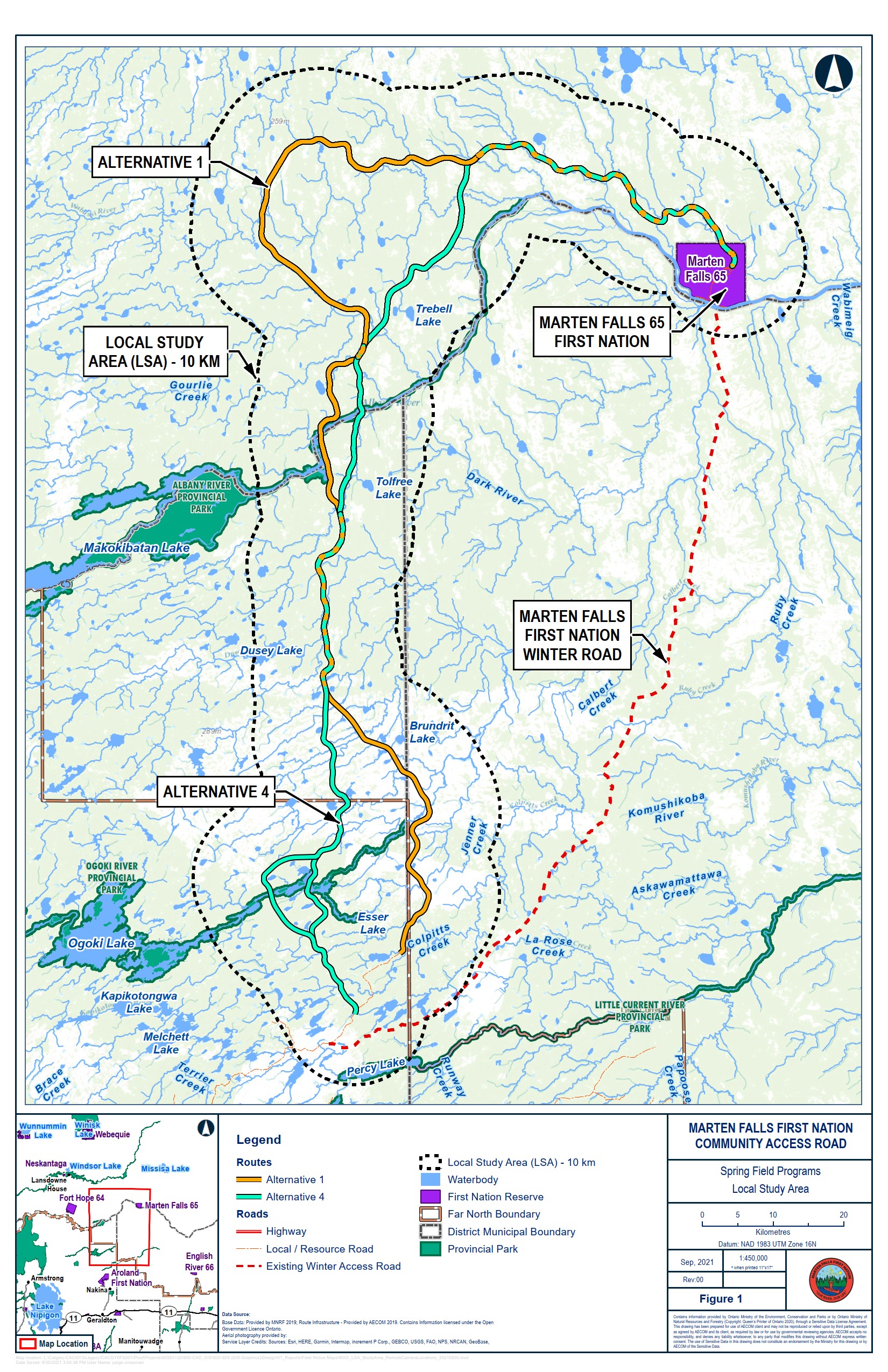Download the PDF version of this Discussion Guide (PDF 4 MB)
Published: March 2022
This Discussion Guide provides an overview to these upcoming Field Programs. We welcome your feedback on the key questions listed in this Guide. Your insights and knowledge will help shape and enrich our field studies.
Spring Field Programs will begin for the federal Impact Assessment (IA) and provincial Environmental Assessment (EA) for Marten Falls First Nation’s proposed All-Season Community Access Road.
A field notice will be distributed once dates are confirmed and information will be provided regularly by email in our monthly Project Updates.
We Need Your Input!
Your input is an important part of shaping our Spring Field Programs and will be considered before the field programs start. Check out the next few pages to learn about the programs and where we are looking for your feedback.
Indigenous Knowledge and information on Indigenous land and resource use in the area of the proposed routes can be shared through the Project’s Indigenous Knowledge Program. If you have sensitive and confidential information that you would like to share through this program, please let us know. We will ensure your knowledge is protected. Read on to learn about the upcoming field program.
Groundwater and Geochemistry Field Program

The purpose of the Groundwater and Geochemistry Field Program is to understand the current groundwater quantity and quality in the study area. A discussion guide was distributed in July 2021 and a Field Notice was distributed in October 2021—both documents include a map and more information about the program, which is now anticipated to start as early as March 2022.
Prior to initiating the groundwater program, a separate Wolverine Denning Survey will be conducted. The purpose of this survey is to observe wolverine tracks from the air to understand the presence of wolverine dens near proposed groundwater monitoring wells. This program is expected to occur in March 2022. A Field Notice distributed on February 14, 2022, includes more details. Once the denning surveys are complete, the groundwater program itself will begin. The first component is to clear a small area for the helicopter and equipment to land so that the wells can be installed.
Groundwater monitoring wells will be set up in the study area and sampled for two years. The wells will extend into the ground far enough to reach the groundwater; the depth of each well will vary by location. Above ground, the wells are relatively small, about 10 centimetres across and 75 centimetres tall. When the wells are no longer required, they will be filled in and sealed.
Surface Water Field Program

The Surface Water Field Program started in September 2019 and consisted of collecting information on stream crossings and fish habitat. In Fall 2021, water and sediment samples were collected from crossings in the study area and we conducted aerial assessments of the crossings. Two Marten Falls First Nation members joined the team to help with surface water surveys. A discussion guide was distributed in July 2021 and a Field Notice was distributed in August 2021—both documents include a map and more information about the program, which is now happening again, starting in June.
Physiography Field Program

The Physiography Field Program will collect information on geologic features and soil conditions including moisture and nutrient levels. This information is important to better understand the current conditions and relationship between the soil and the ecosystems that depend on it, including plants that grow in the forest (e.g., Jack Pine (Okikatik)) and wetlands (e.g., various willows (Wiisihkobihmagoon)). A discussion guide was distributed in July 2021 and includes a map and more detailed information about the program which is happening again and is anticipated to start in June 2022.
Vegetation Field Programs

In September 2019 and 2021, the Vegetation Field Programs included ground and visual surveys. Two Marten Falls First Nation members joined the team to help with this study—read about their experiences in our October 2021 E-Blast. Field crews will continue to visit locations across the study area to document which types of plants are present such as fungi, lichens, species at risk and traditional use plants. A discussion guide was distributed in July 2021 and includes a map and more detailed information about the program, which is happening again and is anticipated to start in June 2022.
Ungulate Remote Camera Field Program

The Ungulate Remote Camera Program began in June 2019 when remote, motion sensor wildlife cameras were placed on active game trails through the Local Study Area. Cameras were retrieved later that year. New cameras were deployed in June 2021 and will stay in place for two years with maintenance visits occurring every six months. These cameras will collect important information on the presence and seasonal patterns of caribou, moose, wolves and other wildlife. Three Marten Falls First Nation members joined the team to help with this program.
A discussion guide was distributed in May 2021 and includes a map and more detailed information about the program. The next maintenance visit is planned to start in May 2022.
Wolverine Hair Snag Surveys

In February 2022, 54 non-invasive hair snag traps were placed in the study area (they do not injure the animal). A Field Notice and Discussion Guide were distributed in December 2021—both documents include a map and more information about the program. Wolverine (wishkobish) are a Species of Special Concern and considered a Threatened Species. Remote cameras will be positioned to monitor the baited hair snag traps to help confirm if a wolverine (wishkobish) will be collected and submitted for DNA and hormone analysis. Hair snag traps will stay in place until May 2022. Field crews will return to the hair snag traps monthly until May to replenish bait and collect hair samples. Next winter, the program will resume from January to May.
Two Marten Falls First Nation members joined the team to help with this program.
If you have sensitive and confidential information that you would like to share through the Indigenous Knowledge Program to make sure it is protected, please let us know.
Contact Information
You are welcome to contact the Project Team at any time with questions or comments
Lawrence Baxter
Senior Community Member Advisor
Marten Falls First Nation
1-800-764-9114
info@martenfallsaccessroad.ca
https://www.facebook.com/MFFNCommunityAccessRoadProject/


